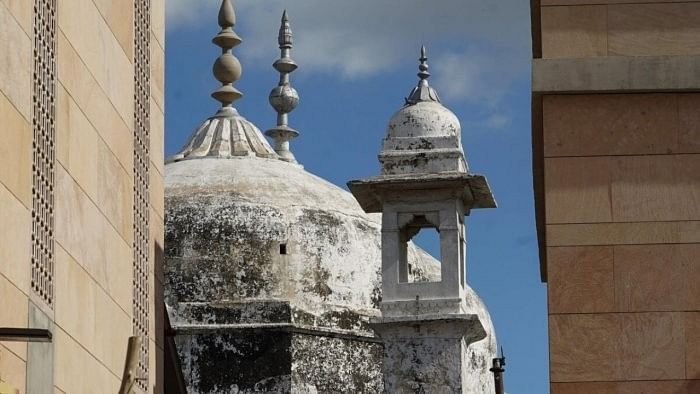
The Gyanvapi mosque.
Credit: PTI File Photo
The Gyanvapi mosque cellar hearing was postponed on February 7 Justice Rohit Ranjan Agrawal
On February 7, Hindu counsel stadte that prayers had been held in the mosque cellar once a year since 1993
Muslim counsel refuted Hindu side's claim saying that the cellar was being used as a storeroom
Muslim side questioned the presence of the AG in the court room and now-retired judge's Jan 31 order allowing Hindus to pray in the mosque cellar
Gyanvapi row: Varanasi court fixes February 15 for hearing petition
A fresh plea was filed in a fast track court in Varanasi seeking a scientific survey of what the Hindu side had termed as 'shivling', which was found during the last year's scientific survey in the contentious Gyanvapi Mosque complex by the Archaeological Survey of India (ASI), and other unsurveyed parts of the Mosque.
Admitted fact that since 1993 there has been no puja in tehkhana, says Puneet Gupta advocating for the Muslim side
"If after 30 years the Court is appointing a receiver and changing status quo, there must be some cogent reason", he said
The court by reiterating the order of 17th Jan, granted a mandatory injunction, says Gupta
"By giving the relief, the District Judge virtually allowed the prayer of the plaint. You made an oral mention before the court", he argued.
The District Judge had become functus officio once the Jan 17 application was allowed: Gupta
"Prayer A was allowed and Prayer B was modified. Koi clerical mistake hoti to change kar dete (on 31st January), but the District Judge changed the entire order", he argued.
DJ allowed something which was allegedly last performed in 1993 in 2024, without recording any finding, argues Gupta
"There is not a single word why such a strong mandatory injunction has been issued virtually allowing prayer d of the main plaint", he said.
Gupta argued that Hindus were never in possession of the Vyas Tehkhana
January 31 order totally 'bad in law', says Gupta
"The District Judge failed to record his satisfaction before passing the order that no irreparable loss would be caused to the Gyanvapi Mosque committee. Not a single line in that rwgard, no balance of convenience, no irreparable loss. There is no satisfaction recorded. In this background, I submit that the order dated 31st January is totally bad in law", he said.
Site's possession was to be decided after framing of issues, Judge said something else by the operative portion: SFA Naqvi, Senior counsel for Muslim side
"The court below has categorically observed that the questions about whether the site was taken from the plaintiff, or whether he surrendered it is to be will be decided after the framing of issues. But by the operative portion, the Judge said something else", he argued.
The plaintiff admitted that the application was disposed of on January 17, Naqvi argued
He said, "Whether there is any provision or power, besides 151 & 152, to pass an order on an application which is disposed of?"
Whatever the plaintiff said, court accepted it as gospel truth
"This order (of January 31st) itself reflects that the order was not passed under any provisions of CPC. It was passed under the influence of the plaintiff. There is no written statement, who is this person who appears after 30 years and claims rights", he said.
In babri masjid case, a person from nirmohi akhada, stopped and asked for rights, SC did ground research and rejected the application: Naqvi
"Here, after 31 years, they come up seeking a right. The application was granted without asking the plaintiff as to why the suit should be entertained after 31 years. By allowing this interim application that final prayer has been granted", he added.
Hearing postponed to February 15
Deccan Herald is on WhatsApp Channels | Join now for Breaking News & Editor's Picks